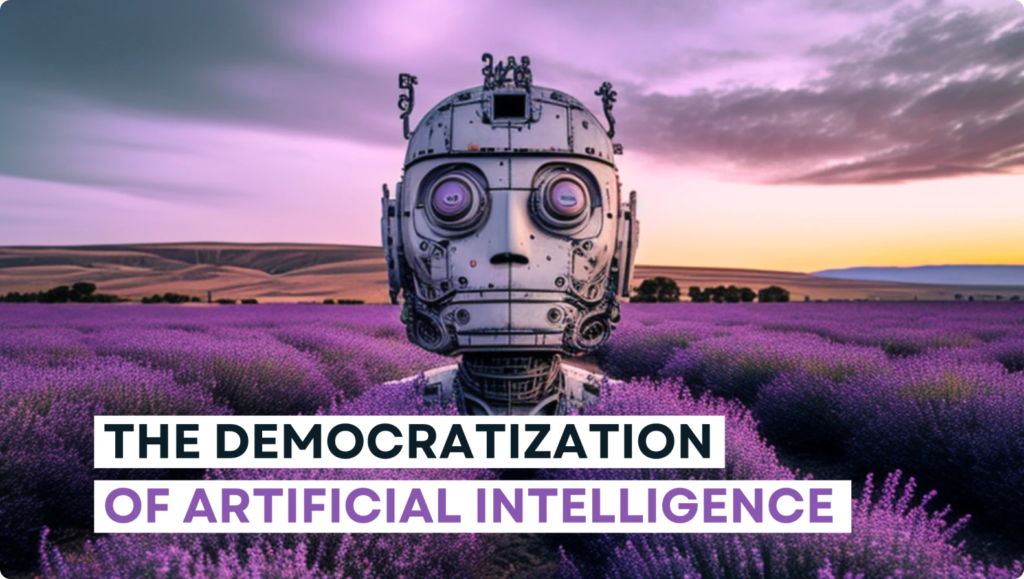The democratization of artificial intelligence (AI) refers to the process of making AI technologies more accessible and affordable to a broader range of individuals and organizations. This movement aims to empower everyone, from small businesses to individual developers, by lowering the barriers to entry for utilizing AI. Here are some key aspects and implications of this trend:

Key Aspects of Democratization of AI
- Access to Tools and Resources:
- Advances in cloud computing have made powerful AI tools available without the need for substantial upfront investment in hardware.
- Platforms like Google Cloud, Microsoft Azure, and Amazon Web Services provide AI services that can be accessed on a pay-as-you-go basis.
- Open-Source Frameworks:
- The rise of open-source frameworks, such as TensorFlow, PyTorch, and Scikit-learn, allows developers to create AI models without needing proprietary software.
- Open-source libraries and datasets foster collaboration and innovation, enabling users to build upon existing work.
- Education and Training:
- Online learning platforms (e.g., Coursera, edX) offer accessible courses on AI and machine learning, making it easier for anyone to learn these skills.
- Universities and institutions are increasingly integrating AI into their curricula, preparing the next generation for a data-driven world.
- User-Friendly Interfaces:
- Development of no-code and low-code platforms allows users without technical expertise to build AI applications.
- Tools like Google’s AutoML and Microsoft Power Apps enable business users to leverage AI without deep programming knowledge.
- Community and Collaboration:
- Online communities and forums, such as GitHub and Kaggle, foster collaboration among AI enthusiasts and professionals, promoting knowledge sharing.
- Hackathons and competitions provide opportunities for developers to showcase their skills and create innovative solutions.
Implications of AI Democratization

- Empowerment of Small Businesses:
- Small and medium-sized enterprises (SMEs) can leverage AI to optimize operations, improve customer service, and enhance decision-making processes.
- Affordable AI solutions enable SMEs to compete with larger organizations that traditionally had more resources.
- Innovation and Entrepreneurship:
- The accessibility of AI tools encourages innovation, leading to the emergence of startups focused on AI-driven solutions across various sectors.
- Entrepreneurs can experiment and iterate on AI applications quickly, fostering a culture of creativity and disruption.
- Diversity and Inclusion:
- Democratizing AI allows a more diverse range of voices and perspectives to contribute to AI development, leading to more inclusive technologies.
- By involving individuals from various backgrounds, the resulting AI systems can be more equitable and representative of society.
- Ethical Considerations:
- As AI becomes more widely accessible, the need for ethical guidelines and best practices becomes increasingly important.
- Ensuring responsible AI use involves educating users about potential biases, privacy concerns, and the societal impact of AI technologies.
- Job Market Transformation:
- The integration of AI into various industries will transform job roles, requiring new skills and adaptability from the workforce.
- While some jobs may become obsolete, AI also creates opportunities for new roles in AI development, data analysis, and ethics.
Conclusion
The democratization of AI holds significant promise for individuals and organizations alike. By making AI technologies accessible to a wider audience, we can unlock innovation, foster entrepreneurship, and create a more inclusive technological landscape. However, as we move forward, it is essential to address the ethical implications and ensure that the benefits of AI are distributed equitably across society. The journey towards a more democratized AI landscape is just beginning, and its potential to reshape our world is immense.

No responses yet